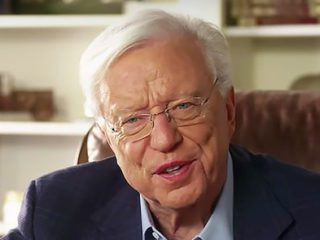All my friends have some similarities to me and some differences. One shares a background in Southern fundamentalism but thinks it bizarre that I read the sports pages; another enjoys many of the same authors I read but thinks me an old fogey for listening to classical music. Every relationship spawns a kind of dance between the self and the other. How much more so with a holy, ineffable God who lives in a realm of spirit.
I am overwhelmed by the vastness of God, the imbalance of any creature’s relationship to such a being. “Since it is God we are speaking of, you do not understand it. If you could understand it, it would not be God,” said Saint Augustine. We who barely comprehend ourselves are approaching a God we cannot possibly comprehend. No wonder some Christians through the centuries have felt more comfortable praying to saints or relying on intermediaries.
As a journalist, I have had occasion to spend time with famous people who make me feel very small. I have interviewed two presidents of the United States, members of the rock band U2, Nobel laureates, television stars, and Olympic athletes. Although I prepare my questions thoroughly in advance, I rarely sleep well the night before and have to fight a case of nerves. I hardly think of these people as mutual friends. I wonder what I would do if seated at a banquet next to, say, Albert Einstein or Mozart. Would I chitchat? Would I make a fool of myself?
In prayer I am approaching the creator of all that is, Someone who makes me feel immeasurably small. How can I do anything but fall silent in such presence? More, how can I believe that whatever I say matters to God? If I step back and look at the big picture, I even wonder why such a magnificent, incomprehensible God would bother with a paltry experiment like planet earth.
The Bible sometimes emphasizes the distance between humans and God (subjects of a king, defendants before a judge, servants of a master) and sometimes emphasizes the closeness (bride of a bridegroom, sheep of a shepherd, God’s offspring). Without question, though, Jesus himself taught us to count on the closeness. In his own prayers he used the word Abba, an informal word of address that Jews before him had not used in prayer. A new way of praying was born, says the German scholar Joachim Jeremias: “Jesus talks to his Father as naturally, as intimately and with the same sense of security as a child talks to his father.”
The early churches adopted Jesus’ style of intimate prayer. “Because you are sons, God sent the Spirit of his Son into our hearts, the Spirit who calls out, ?Abba, Father,’ ” Paul assured them. Elsewhere he takes the intimacy one step further: “We do not know what we ought to pray for, but the Spirit himself intercedes for us with groans that words cannot express.”
In one hand I hold the truth of God’s vastness, and in the other hand I hold the truth of God’s desire for intimacy. Dante spoke of “the love that moves the sun and other stars.” I gaze at the stars and marvel at the apparent insignificance of the entire human experiment; then I read a biblical passage about God rejoicing over us with singing. Only lately have I understood that the vast difference between God and us allows this very capacity. God operates by different rules of time and space. And God’s infinite greatness, which we would expect to diminish us, actually makes possible the very closeness that we desire.
A God unbound by our rules of time has the ability to invest in every person on earth. God has, quite literally, all the time in the world for each one of us. The psalmist exclaimed that “a thousand years in your sight are like a day that has just gone by,” and the reverse also applies: to God, one day is like a thousand years. The common question, “How can God listen to millions of prayer at once?” betrays an inability to think outside time. I cannot imagine a being who can hear billions of prayers in thousands of languages because I am stunted by my humanity. Trapped in time, I cannot conceive of infinity. The distance between God and humanity — a distance that no one can grasp — is, ironically, what allows the intimacy.
Jesus, who accepted the constraints of time while living on this planet, understood better than anyone the vast difference between God and human beings. Obviously, he knew of the Father’s greatness and at times reflected nostalgically on the big picture, “the glory I had with you before the world began.” Yet Jesus did not question the personal concern of God who watches over sparrows and counts the hairs on our heads.
More to the point, Jesus valued prayer enough to spend many hours at the task. If I had to answer the question “Why pray?” in one sentence, it would be, “Because Jesus did.” He bridged the chasm between God and human beings. While on earth he became vulnerable, as we are vulnerable; rejected, as we are rejected; and tested, as we are tested. In every case his response was prayer.
From Prayer: Does It Make Any Difference? by Philip Yancey Copyright © 2007 by Philip Yancey, published by Zondervan, used with permission.










